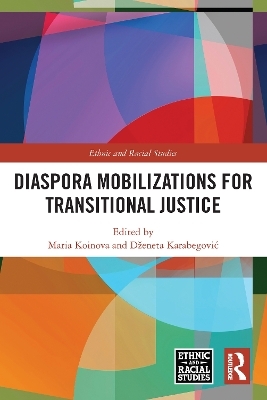
Diaspora Mobilizations for Transitional Justice
Routledge (Verlag)
978-0-367-51108-1 (ISBN)
Transitional justice and diaspora studies are interdisciplinary and expanding fields of study. Finding the right combination of mechanisms to forward transitional justice in post-conflict societies is an ongoing challenge for states and affected populations. Diasporas, as non-state actors with increased agency in homelands, host-lands, and other global locations, engage with their past from a distance, but their actions are little understood.
Diaspora Mobilizations for Transitional Justice develops a novel framework to demonstrate how diasporas connect with local actors in transitional justice processes through a variety of mechanisms and their underlying analytical rationales—emotional, cognitive, symbolic/value-based, strategic, and networks-based. Mechanisms featured here are: thin sympathetic response and chosen trauma, fear and hope, contact and framing, cooperation and coalition-building, brokerage, patronage, and connective action, among others. The contributors discuss the role of diasporas in truth commissions, memorialization, recognition of genocides and other human rights atrocities, as well as their abilities to affect transitional justice from afar by holding particular attitudes, or upon return temporarily or for good.
This book sheds light on how diasporas’ contextual embeddedness shapes their mobilization strategies, and features empirical evidence from Europe, United States and Canada, as well as from conflict and postconflict polities in the Balkans, Middle East, Eurasia and Latin America. It was originally published as a special issue of Ethnic and Racial Studies.
Maria Koinova is Professor in International Relations at the University of Warwick. She is the author of Diaspora Entrepreneurs and Contested States, forthcoming with Oxford University Press (2020) and of numerous articles on diasporas in world politics published from the ERC project ‘Diasporas and Contested Sovereignty’, which she directed between 2012 and 2017; www.diasporacontest.org. Dženeta Karabegović is researcher and lecturer at the University of Salzburg in the Division of Political Science and Sociology. Her wider research interests are rooted in international and comparative political sociology with a particular focus on transnationalism, diaspora, migration, human rights, education, transitional justice, and the Balkans.
1. Introduction: Causal mechanisms in diaspora mobilizations for transitional justice
Maria Koinova and Dženeta Karabegović
2. Diaspora influence on the thin sympathetic response in transitional justice
Joanna R. Quinn
3. Transitional justice and acceptance of cohabitation in Cyprus
Charis Psaltis, Neophytos Loizides, Alicia LaPierre and Djordje Stefanovic
4. Diaspora mobilization and the Ukraine crisis: old traumas and new strategies
Milana Nikolko
5. Diaspora coalition-building for genocide recognition: Armenians, Assyrians and Kurds
Maria Koinova
6. Who chooses to remember? Diaspora participation in memorialization initiatives
Dženeta Karabegović
7. Syrian diaspora mobilization: vertical coordination, patronage relations, and the challenges of fragmentation in the pursuit of transitional justice
Espen Stokke and Eric Wiebelhaus-Brahm
8. Networking justice: digitally-enabled engagement in transitional justice by the Syrian diaspora
Chris Tenove
| Erscheinungsdatum | 08.03.2022 |
|---|---|
| Reihe/Serie | Ethnic and Racial Studies |
| Verlagsort | London |
| Sprache | englisch |
| Maße | 156 x 234 mm |
| Gewicht | 290 g |
| Themenwelt | Geschichte ► Teilgebiete der Geschichte ► Wirtschaftsgeschichte |
| Recht / Steuern ► Allgemeines / Lexika | |
| Recht / Steuern ► Arbeits- / Sozialrecht ► Sozialrecht | |
| Recht / Steuern ► EU / Internationales Recht | |
| Sozialwissenschaften ► Soziologie | |
| ISBN-10 | 0-367-51108-8 / 0367511088 |
| ISBN-13 | 978-0-367-51108-1 / 9780367511081 |
| Zustand | Neuware |
| Haben Sie eine Frage zum Produkt? |
aus dem Bereich


